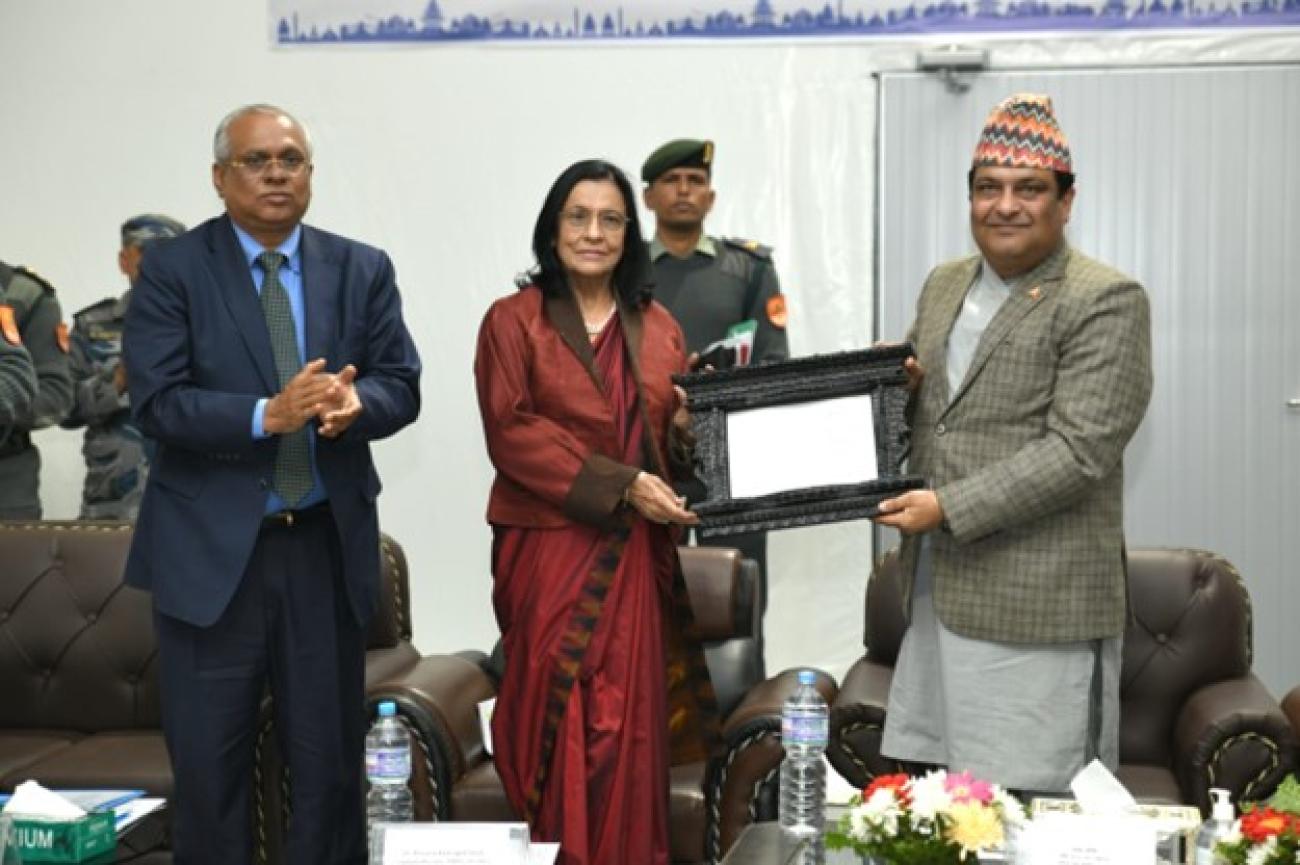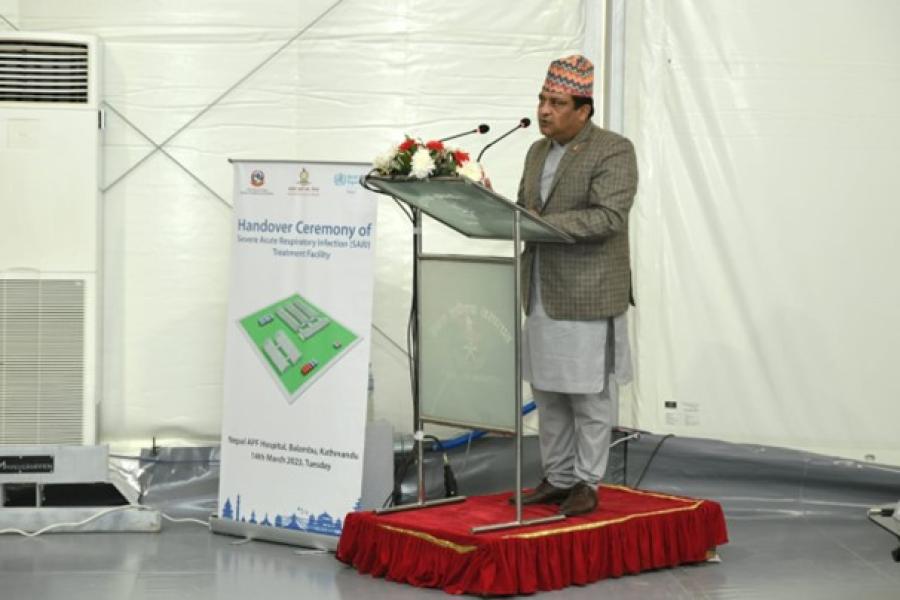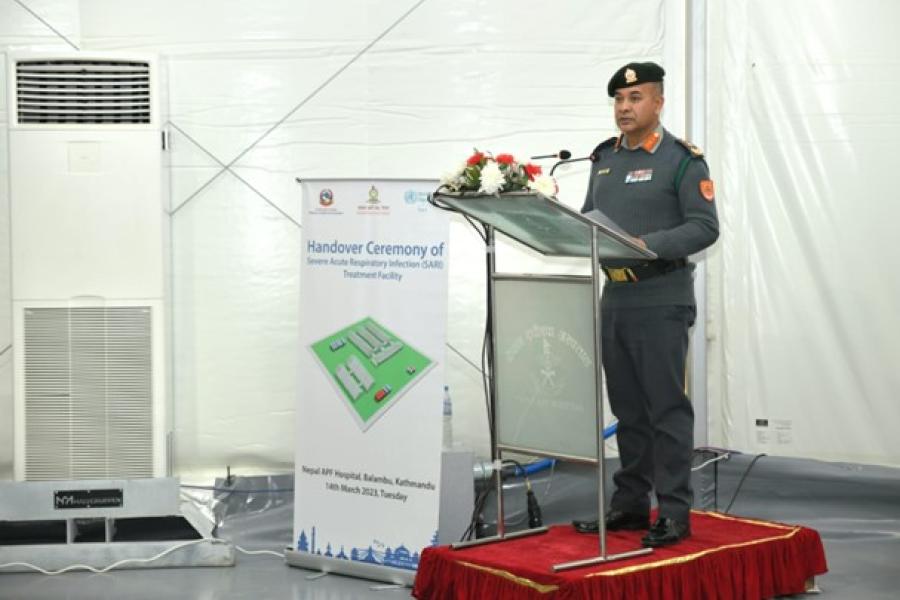WHO and WFP hand over the Severe Acute Respiratory Infections Treatment Facility to Government of Nepal

WHO and WFP today handed over a Severe Acute Respiratory Infections Treatment Facility located at the Nepal APF Hospital in Balambu to the MoHP.
The World Health Organization and the World Food Programme today handed over a Severe Acute Respiratory Infections Treatment Facility located at the Nepal Armed Police Force Hospital in Balambu to the Ministry of Health and Population.
The facility was handed over in the presence of Regional Director, WHO South-East Asia, Dr Poonam Khetrapal Singh, Secretary of Ministry of Health and Population, Dr Roshan Pokhrel, Chief of Armed Police Force, Inspector General Raju Aryal. The WHO Country Representative to Nepal, Dr Rajesh Sambhajirao Pandav, and WFP representatives were present at the occasion.
Spread across approximately 7,600 square meters, the Severe Acute Respiratory Infections (SARI) facility is the first of its kind in the South-East Asia Region, built to respond to mild, moderate, severe and critical cases of COVID-19 and other infectious respiratory diseases.
"The setting up of the facility is in line with WHO’s regional flagship priority to strengthen preparedness and response capacities for public health emergencies. Acute respiratory infections are among the leading cause of morbidity and mortality globally. This facility would serve as a model referral center for respiratory infections, and also help in responding to surge in cases,” said Dr Poonam Khetrapal Singh, WHO Regional Director for South East Asia
"We're proud of our collaboration with the Ministry of Health and Population, the Armed Police Force and WFP on installing this facility which will add value to the country's health infrastructure in catering to patients suffering from respiratory infections," said Dr Rajesh Pandav, WHO Representative to Nepal.
The facility's design is based upon the high standard of infection prevention and control measures needed for the treatment of people with infectious respiratory diseases. This is done by having a designated triage, separate staff areas, one-direction patient flow, and by ensuring proper ventilation and negative-pressure air filtration systems to reduce the spread and transmission of the acute respiratory infections. The facility is divided into mild/moderate/severe and critical wards.
As a specialized facility in a referral pathway, the facility which consists of up to 92 beds will help to reduce the risk of exposure for healthcare workers, patients, and communities when transmission of infection is widespread at community level during an epidemic or a pandemic scenario.
Following a request from the Ministry of Health and Population to set up a field hospital amidst the COVID-19 pandemic, the SARI facility was mobilized from the global donation support of WFP to WHO. WHO Nepal in close collaboration with the Ministry then facilitated its large volume transport and arrival in country at a time when global logistics transport was greatly challenged. WHO Nepal provided technical and financial support for its proper installation and functionality.

Dr Roshan Pokhrel, Secretary, Ministry of Health and Population acknowledged the support of WHO and WFP for setting up the facility.
"The Ministry of Health and Population is thankful to WHO and WFP for their generous support to set up this facility in Nepal. The Ministry is committed to working with AFP Hospital to design the Standard Operating Procedures to ensure smooth operation of this facility to respond to outbreaks in the future," said Secretary Pokhrel.
“The temporary Severe Acute Respiratory Illness treatment facility at the Armed Police Force hospital in Kathmandu is a donation from the UN World Food Programme to World Health Organization. It consists of 92 bed facility for mild, severe, critical and ICU cases, and is equipped with a kitchen, dining hall, laundry, and a pharmacy. WFP Nepal provided engineering services to design and construct the ground base, as a preparation support for the installation of SARI treatment facility," said Mr Robert Kasca, Country Director for World Food Programme.
The SARI facility can also be used for other infectious disease such as MERS-CoV, SARS-CoV or severe acute respiratory syndrome coronavirus 2 (SARS-CoV2); human influenza caused by a new subtype, including human episodes of avian influenza; pneumonic plague; and novel acute respiratory infections that can cause large-scale outbreaks or outbreaks with high morbidity and mortality.

Under the leadership and management of Armed Police Force (APF) Hospital, this facility is designed to be used when current health service delivery is overwhelmed by an infectious disease outbreak or support surge patient care during a mass causality event.
WHO is continuing to support these areas under MoHP and APF leadership and management.
For more information:
Ms Monica Upadhyay, World Food Programme Nepal, monica.upadhyay@wfp.org
Ms Tsering Dolkar Gurung, World Health Organization Nepal, gurungt@who.int

